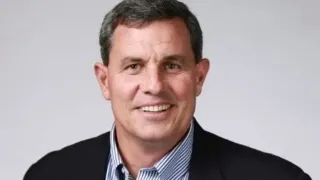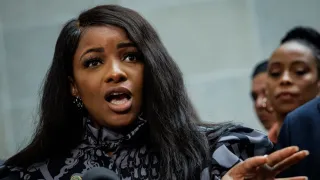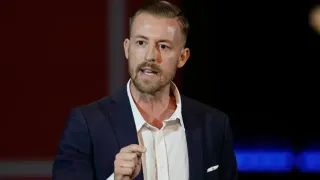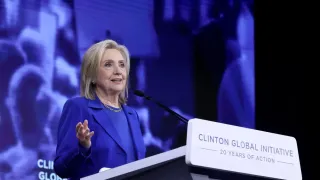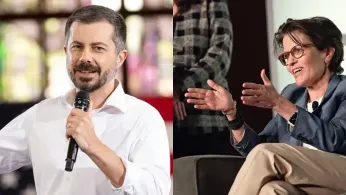
5 hours ago
Pete Buttigieg Responds to Tucker Carlson’s “Gay Sex” Questions with Humor and Grace on Kara Swisher’s Podcast
READ TIME: 4 MIN.
On September 3, 2025, conservative commentator Tucker Carlson reignited controversy on his podcast, "The Tucker Carlson Show" by questioning the authenticity of Pete Buttigieg’s sexuality. Carlson, in conversation with Michael Knowles, called Buttigieg “the fake gay guy” and suggested that Buttigieg had only recently been with a woman, implying that his sexuality was a political convenience rather than an authentic identity. Carlson further escalated his remarks by expressing a desire to ask Buttigieg “very specific questions about gay sex” to determine whether Buttigieg “even knows” about it—a comment widely criticized as both invasive and unserious by LGBTQ+ advocates and allies .
Carlson’s comments represent a continuation of a pattern: he has previously asserted that Buttigieg’s public identity as a gay man is questionable, making similar statements in 2024. This narrative plays into longstanding tropes questioning the legitimacy of LGBTQ+ public figures, often as a means to undermine their authority or distract from substantive policy debate .
Appearing on journalist Kara Swisher’s podcast, Buttigieg was asked to respond to the latest round of Carlson’s claims and the viral memes they have spawned. Buttigieg chose to address the topic with characteristic humor, stating, “I suppose it’s a sign of progress that their idea of a conspiracy is that I’m actually secretly straight.” He added, “Chasten, my husband, has threatened to have my gay card revoked so many times. This is just going to be the latest” .
When Swisher, herself an out lesbian and veteran journalist, referenced the meme culture surrounding the “fake gay” accusation, Buttigieg acknowledged the absurdity of the discussion. “I cannot think of a topic I would like to discuss less with Tucker Carlson than that,” he said, laughing. “Even though I will admit some level of morbid curiosity on what in the hell he thinks… Actually, no” .
Buttigieg’s remarks emphasized both the personal and political toll of such accusations, while also refusing to engage on Carlson’s terms. Throughout the exchange, Buttigieg maintained a tone of dignity, refusing to dignify Carlson’s provocations with a substantive response and instead highlighting the ridiculousness of the premise.
LGBTQ+ advocates and commentators have widely condemned Carlson’s remarks as emblematic of a persistent strain of homophobia in American media and politics. The suggestion that one’s sexual orientation can be “proven” or “tested” through public interrogation not only misrepresents the complexity of LGBTQ+ identities but also perpetuates harmful stereotypes and undermines the privacy and dignity of LGBTQ+ individuals .
Buttigieg’s experience is not unique; public figures who are open about their LGBTQ+ identities often face intense scrutiny and questioning, both from political opponents and from segments of the media seeking to sensationalize their personal lives. Advocates note that such tactics are designed to delegitimize LGBTQ+ leadership and distract from substantive policy debates, particularly when LGBTQ+ leaders are making strides in historically exclusionary spaces.
Organizations such as the Human Rights Campaign and GLAAD have called out the repeated questioning of LGBTQ+ figures’ authenticity as a form of rhetorical violence, noting that it not only harms the individual targeted but also sends a chilling message to all LGBTQ+ people considering lives of public service. These organizations urge media outlets to focus on leaders’ policy records and contributions rather than on sensationalized aspects of their private lives .
Buttigieg, who came out as gay in 2015 while serving as mayor of South Bend, Indiana, has been open about his journey, his marriage to Chasten Buttigieg, and their adoption of twins in 2021. He has consistently leveraged his platform to advocate for LGBTQ+ rights and visibility, frequently citing the power of representation in government and public life .
Kara Swisher, who has long reported on LGBTQ+ issues in tech and media, offered her own advice on handling such provocations: “You have to say, ‘Tucker, I’m not interested. Stop flirting with me.’ They go away really quick” .
Buttigieg’s refusal to be drawn into Carlson’s line of questioning stands as a testament to the resilience of LGBTQ+ leaders under attack. His response—rooted in humor, self-assurance, and a refusal to be shamed—serves as a model for how public figures can maintain their dignity and composure in the face of bad-faith questioning.
While Carlson’s questions and accusations are widely viewed as baseless and offensive, Buttigieg’s response highlights not only the persistence of anti-LGBTQ+ rhetoric in American life but also the power of resilience and humor in responding to such attacks. As LGBTQ+ representation in politics and media continues to grow, public figures like Buttigieg face unique challenges, but also have the opportunity to model strength, authenticity, and grace under fire.
The ongoing debate over LGBTQ+ authenticity, while distressing, also signals a shift: as LGBTQ+ people become more visible and influential, detractors are increasingly forced to rely on fringe arguments that are easily dismissed by both the LGBTQ+ community and its allies. The fact that a national conversation can revolve around whether a former Cabinet secretary is “gay enough” is itself a sign of the remarkable, if incomplete, progress made in the fight for LGBTQ+ equality .
